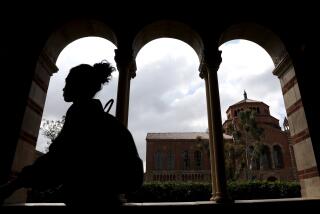Series of cases in China bring school sex abuse out of shadows
BEIJING — In China’s southern Hainan province, a school principal and a housing authority official were arrested after they allegedly took six girls ages 11 to 13 out to sing karaoke, got them drunk and spent the night with them in a hotel.
A principal in Anhui province was arrested on suspicion of molesting nine girls, and a 50-year-old math teacher in the same province was charged with raping a 7-year-old girl. A kindergarten security guard was arrested, accused of molesting children.
All these incidents took place in the last three weeks, an unusual spate of sexual abuse cases in a country where such matters are seldom discussed and too-infrequently prosecuted.
Despite the government’s role in publicizing the cases and promise to crack down on child abusers, the incidents are inspiring protests — on the streets and on the Internet — and accusations of a ham-handed coverup attempt as parents were forbidden to retain lawyers.
“I don’t know why I couldn’t hire a lawyer. I don’t understand. I’m just a simple farmer,” said the father of a 12-year-old in the Hainan case, who asked not be quoted by name to protect the family’s privacy.
A 38-year-old activist was arrested Thursday at her home in the southern province of Guangxi after protesting in front of the Wanning elementary school in Hainan, whose principal allegedly spent the night with his underage pupils. Ye Haiyan, who advocates for the rights of prostitutes, had been picketing with a banner reading, “If you want to get a room” — a Chinese euphemism for having sex — “call me and leave the children alone.”
The phrase caught on, and by week’s end hundreds of Chinese, men and women, had posted photographs of themselves on microblogs holding banners with the same message.
In China, sexual abuse of children has not been the high-profile issue that it is in the United States, or more recently Britain.
That changed on a dime last month. Within the last three weeks, there have been nine major cases of sexual abuse in schools around the country, with more than 30 children involved.
The common denominator in the cases is that those accused of abuse have been people with power, such as principals or teachers, and their alleged victims often children of migrant workers or farmers. Millions of working parents must leave their children with grandparents or at boarding schools, where the young people don’t always receive adequate supervision.
Most cases of sexual abuse “happen to the children of people who don’t have money and don’t have power,” said Li Yinhe, a Beijing-based sociologist who writes frequently about sex. She also blamed limited sex education in the Chinese school system.
“Children here have zero sex education. They have no sense that there are some parts of their bodies that other people aren’t allowed to touch, and it is very easy for them to be abused by people they trust, like a principal or teacher,” she said.
The sudden proliferation of sexual abuse cases appears to be the result of rising awareness and a decision by the government to allow reporting on the subject.
The Communist Party-affiliated Global Times reported Friday that China’s top judge, Zhou Qiang, wanted to “foster an environment conducive to the healthy development of minors by publicizing several child abuse cases, after a string of sexual offenses against children by their teachers led to widespread public outrage.”
State media also reported that a 47-year-old village primary school teacher had been recently executed for raping six 9- and 10-year-old girls and making pornographic videos of them.
The publicity campaign coincided with Children’s Day, which is celebrated June 1 in China.
“We will firmly prevent and crack down on any words and deeds that would damage children’s interests or harm their physical and mental health,” President Xi Jinping was quoted by state media Friday as saying during a visit to the Beijing Children’s Palace, where he was photographed donning the red scarf of the Communist Party’s Young Pioneers.
The most publicized of the abuse cases was in Wanning, known for producing sugar cane, rubber and bananas.
The principal of Wanning Primary School No. 2 (primary schools in China go through ninth grade) and his friend are accused of taking the six girls on May 8 to a karaoke parlor in a nearby city and giving them alcohol, then checking into a hotel with them. The girls were allegedly offered money — some reports say up to $1,600 — to have sex with the men.
The episode has been widely reported here, the public consumed with details of what happened in the hotel room. Doctors who examined the girls afterward released contradictory statements about whether the two men had sexual intercourse with the girls.
Local authorities quickly raised suspicion when the families of the girls were forbidden to retain lawyers. One fear was that the men would be charged not with statutory rape — which carries a 10-year prison term — but with the lesser charge of soliciting underage prostitutes.
“The families only want justice for their daughters,” said Deng Shulin, one of the lawyers who was removed from the case. “But the authorities are telling them not to make a big deal out of this.”
At the same time, authorities are trying to silence the more vociferous activists. Ye Haiyan, the protester arrested Thursday, is being charged with assault after getting into a fight with four people who went to her house complaining about photographs she posted on her popular microblog.
“They came to confront her. They said, ‘Why did you put those pictures on the Internet?’” said a relative who answered the telephone Friday at Ye’s home and gave only her surname, Lan. “It escalated into a fight. She acted in self-defense to scare them away.”
Chinese authorities reported Friday that Ye had been arrested for attacking the visitors with a meat cleaver.
Ye runs a nongovernmental organization called Floating Grass that advocates on behalf of sex workers and abused women as well as AIDS patients.
“I can’t understand what’s happening. Instead of protecting the rights of the young students who were abused, they are going after people like us,” one of Ye’s co-workers said in an interview Friday afternoon.
A few hours later, he called back to ask that his name not be used because he had received a visit from authorities.
Tommy Yang of The Times’ Beijing bureau contributed to this report.
More to Read
Start your day right
Sign up for Essential California for news, features and recommendations from the L.A. Times and beyond in your inbox six days a week.
You may occasionally receive promotional content from the Los Angeles Times.






